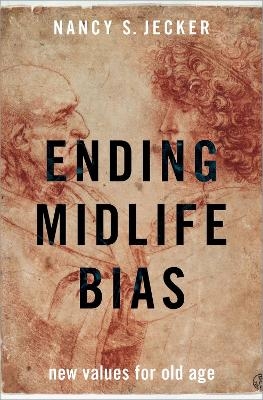
Ending Midlife Bias
Oxford University Press Inc (Verlag)
978-0-19-094907-5 (ISBN)
Nancy S. Jecker coins the term, the life stage relativity of values, to capture the idea that at different stages of our lives, different ethical concerns shift to the foreground. During early life, infants and small children hold dear the value of being cared for and nurtured by someone they trust--and their vulnerability and dependency make these the right values for them. By early adulthood and continuing into midlife, the capacity for greater physical and emotional independence gives people reason to place more emphasis on autonomy and the ability to freely choose and carry out their plan of life. During old age, heightened risk for chronic disease and disability gives us a reason to shift our focus again, emphasizing safeguarding our central capabilities and keeping our dignity and self-respect intact.
Despite different values becoming central at different stages of life, we often assume the standpoint of someone in midlife, who is in the midst of planning a future adulthood that stretches out before them. Jecker coins the term, midlife bias, to refer to the privileging of midlife. Midlife bias occurs when we assume that autonomy should be our central aim at all life stages and give it priority in a wide range of ethical decisions. The privileging of midlife raises fundamental problems of fairness. It also suggests the possibility of large gaps in the ethical principles and theories at hand.
Ending Midlife Bias: New Values for Old Age addresses these concerns in a step-wise fashion, focusing on later life. Jecker first introduces a philosophical framework that extends moral theorizing to older adults, addressing midlife bias, the life stage relativity of values, human capabilities and dignity, time's passage, the narrative self, and justice between old and young. She then turns to policy and practice and explores ethical issues in bioethics, long term care, personal robotic assistants, care of the dying and newly dead, ageism in medical research, the allocation of healthcare, mandatory retirement, and the future of population aging.
Nancy S. Jecker is a Professor of bioethics and philosophy at the University of Washington School of Medicine, Department of Bioethics and Humanities. She holds a Visiting Professorship at the University of Johannesburg, African Centre for Epistemology and Philosophy of Science, and past visiting professorships at the National University of Singapore Center for Biomedical Ethics and the Chinese University of Hong Kong Centre for Bioethics. She is a three-time Rockefeller Foundation awardee, two-time National Endowment for the Humanities awardee, Brocher Foundation Visiting Researcher, and Japanese Society for the Promotion of Science International Fellow. Dr. Jecker was elected to the board of directors for the International Association of Bioethics (2019-2021) and the American Society for Bioethics and Humanities (2017-2019).
Part I: The Philosophical Framework
Chapter 1: Values Across the Lifespan
Chapter 2: What Matters for Individuals in Later Life?
Chapter 3: The Preferred Account of Human Capabilities
Chapter 4: Time's Passage and the Narrative Self
Chapter 5: Justice Between Old and Young
Part II: Policy and Practice
Chapter 6: Healthcare Across the Lifespan
Chapter 7: Who Cares?
Chapter 8: What Cares?
Chapter 9: Ageism
Chapter 10: The Dying, the Newly Dead, and the Long Gone
Chapter 11: Future People
Chapter 12: Conclusion
| Erscheinungsdatum | 12.06.2020 |
|---|---|
| Verlagsort | New York |
| Sprache | englisch |
| Maße | 236 x 163 mm |
| Gewicht | 998 g |
| Themenwelt | Geisteswissenschaften ► Philosophie ► Allgemeines / Lexika |
| Geisteswissenschaften ► Philosophie ► Ethik | |
| Medizin / Pharmazie ► Medizinische Fachgebiete ► Medizinethik | |
| Studium ► Querschnittsbereiche ► Geschichte / Ethik der Medizin | |
| ISBN-10 | 0-19-094907-4 / 0190949074 |
| ISBN-13 | 978-0-19-094907-5 / 9780190949075 |
| Zustand | Neuware |
| Informationen gemäß Produktsicherheitsverordnung (GPSR) | |
| Haben Sie eine Frage zum Produkt? |
aus dem Bereich


